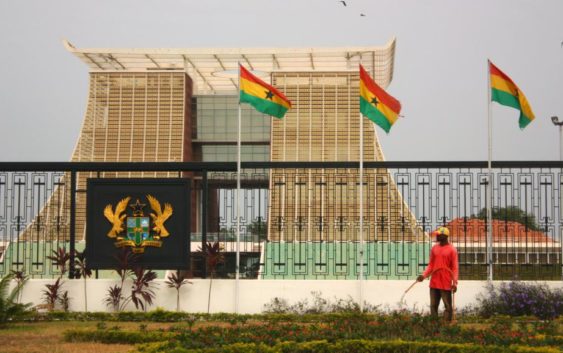- Governor Sanwo-Olu flags off Ojota-Opebi Link Bridge, to be completed in 20 months
- Allow Nigeria go to 2022 World Cup, don’t play qualifiers – Ghana Parliament member tells Black Stars
- There was no second sex tape, Kim Kardashian refutes Kanye West’s claims
- Jaruma Remanded In Prison Over Post On Regina Daniels And Ned Nwoko
- Lanre Gentry confirms paternity of last son with Mercy Aigbe, says ‘He’s my son’ (Photo)
Ghana a ‘beacon of stability and democracy’ – AU

The African Union’s Commissioner for Peace and Security, Ambassador Smail Chergui, says a resilience assessment conducted on Ghana has revealed that the country is “a beacon of stability and democracy.”
Addressing President Akufo-Addo during a courtesy call on him at the Jubilee House, ahead of the official launch of the Country Structural Vulnerability and Resilience Assessment and Country Structural Vulnerability Mitigation Strategy Report of the Republic of Ghana, African Union (AU) Commissioner for Peace and Security, Ambassador Smail Chergui, said the assessment carried out by the AU demonstrates that Ghana is the first country to successfully carry out the Structural Vulnerability and Resilience Assessment on the continent.
“Through this exercise, we found out that Ghana is really a beacon of stability, of democracy and the policies conducted in this country under your leadership Mr. President, gives confidence to the socio-economic space in this country,” Ambassador Chergui said.
On gender matters, Ambassador Chergui observed that the research work found out that Ghana has made progress in maintaining a balance in key positions of government.
The assessment also concluded that Ghana has adopted all the mechanisms to climate change. On the issue of security, the assessment found out that Ghana is doing very well, in that per capita violence is one of the lowest on the entire African continent.
President Akufo Addo in his response said Ghana attaches a great deal of importance to the African Union and the country will continue to submit itself to the Pan African agenda.
The President expressed great delight at the fact that Ghana is the first to have submitted herself to the assessment. He assured that the report will be reviewed and all suggestions and recommendations will be given attention by his government.
The Peace and Security Council (PSC) is the standing organ of the AU for the prevention, management and resolution of conflicts. It is a key element of the African Peace and Security Architecture (APSA), which is the umbrella term for the main AU mechanisms for promoting peace, security and stability in Africa.
The PSC was established to be a collective security and ‘early warning’ arrangement with the ability to facilitate timely and efficient responses to conflict and crisis situations.
The PSC’s core functions are to conduct early warning and preventive diplomacy, facilitate peace-making, establish peace-support operations and, in certain circumstances, recommend interventions in member states to promote peace, security and stability.
The PSC also works in support of peace-building and post-conflict reconstruction as well as humanitarian action and disaster management.
The PSC’s authority derives from Article 20 (bis) of the Constitutive Act (as inserted by Article 9 of the Protocol on Amendments to the Constitutive Act 2003) together with Article 2 of the 2002 Protocol Relating to the Establishment of the Peace and Security Council of the African Union.